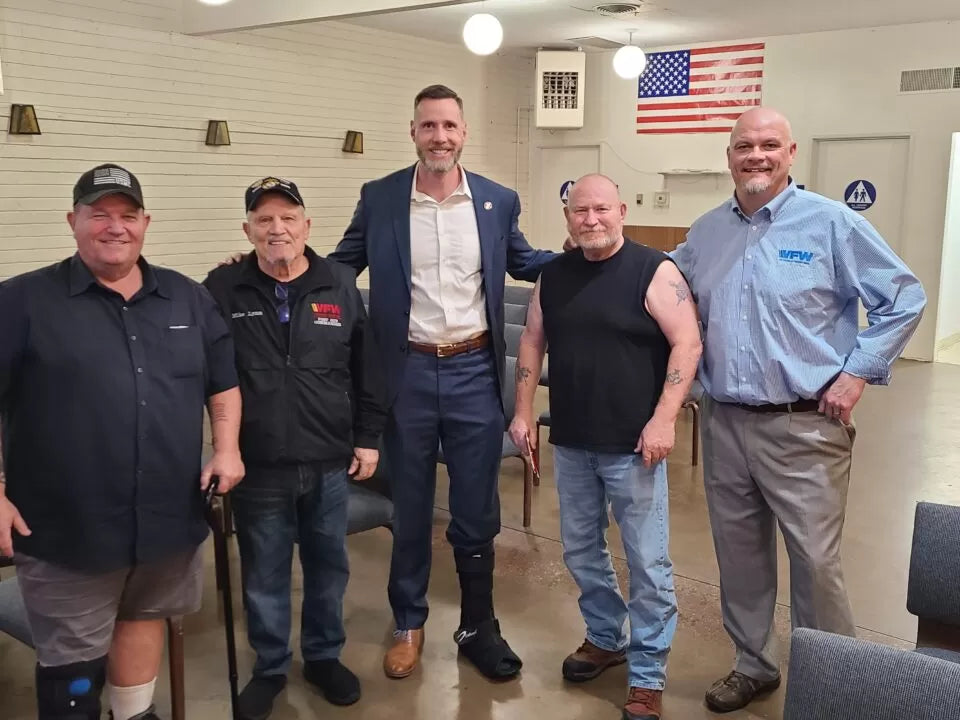Camp Lejeune and The PACT Act: Justice for Deserving Veterans

By now you have probably seen the attorney commercials on television or advertisements on the internet – “Were you at Camp Lejeune? Are you sick? Call now, you may be eligible for government compensation!”
What is this all about?
In addition to my role as the lead partner in Adkisson Pitet’s white-collar criminal defense and government investigations practice, I am proud to partner with Baird Mandalas Brockstedt Federico & Cardea LLC, one of only two firms nationwide entrusted by the VFW, Naval Enlisted Reserve Association, and the Reserve Organization of America to assist veterans and their families impacted by toxic water exposure at Camp Lejeune. As a Marine Corps combat veteran, this work is important and rewarding to me.
Camp Lejuene and the Groundwater Contamination Crisis
Built in 1941, Marine Corps base Camp Lejeune is a sprawling 246 square mile U.S. military training facility in Jacksonville, North Carolina. Camp Lejeune is the largest military base on the east coast. Its many miles of beach and swampy areas make it an ideal training ground for the Marine Corp’s specialty: amphibious assault. Marines are proud to be the “tip of the spear” in global conflict, and Camp Lejeune’s proximity to deep water ports and abundant land for airstrips allows for rapid deployment of troops to hotspots around the world. Home to more than 100,000 people, including service members, their family members, retirees, and civilian contractors, the base is truly its own city, complete with schools, a hospital, restaurants, a bowling alley, a beautiful 18-hole golf course, and several parks for every kind of recreation.
Between the early 1950s and late 1980s, many of the wells supplying Camp Lejeune’s drinking water were badly contaminated by toxins from several sources, including waste from a dry-cleaning facility, leakage from underground fuel storage tanks, and industrial spills. Upwards of one million people drank, cooked with, and bathed in water containing toxicants like tetrachloroethylene (a chemical used in dry cleaning), trichloroethylene (a solvent commonly used in consumer products like paint removers and industrial-grade cleaning fluids), benzene (a chemical used in detergents, plastics, and dyes), and vinyl chloride (a gas used in the manufacture of plastics) at levels several hundred to thousands of times permitted by federal safety standards. Stories among those who were on Camp Lejeune during those years abound about people mixing Kool-Aid into the water to make it taste better, or boiling water to cleanse it – which only served to send the toxic chemicals airborne.
Incredibly, though base officials became aware of contaminated water as early as 1974, they failed to shut down the problematic water wells until 1985. A congressional subcommittee formed in 2010 to investigate the issue took Marine Corps officials to task for the decades they spent preventing full disclosure and failure to promptly shut down the wells upon learning of the contamination. The subcommittee’s report, entitled “Contamination and Compensation, Looking Back, Moving Forward,” states, “The U.S. Marine Corps continued to view past environmental contamination at Camp Lejeune as a public relations battle rather than a public health hazard.”
Military records revealing benzene contamination were uncovered in 2009, which led to hundreds of toxic water victims filing lawsuits pursuant to the Federal Tort Claims Act. The lawsuits were consolidated into multidistrict litigation in the Eastern District of North Carolina but failed due to the North Caroline statute of repose, which is 10 years.
The PACT Act
In August 2022, following over a decade of advocacy led by the Veterans of Foreign Wars, Congress passed the bipartisan Sergeant First Class Heath Robinson (a decorated combat medic who died of a rare form of lung cancer) Honoring our Promise to Address Comprehensive Toxics (“PACT”) Act. The PACT Act is the most significant piece of legislation affecting veterans that has been passed by Congress in the last four decades, and the largest expansion of benefits and services for veterans and their families exposed to toxins in over 30 years. Over five million veterans will receive VA benefits and services because of the PACT Act. Among other things, the PACT Act allows more veterans to enroll in Department of Veterans Affairs (“VA”) health care without having to demonstrate a service-connected disability, codifies the VA’s new process for evaluating and determining presumptive exposure and service connection for various chronic conditions when evidence of a military environmental exposure and the associated health risks are strong in the aggregate but difficult to prove individually, removes the requirement for some veterans and their survivors to prove service connection if they are diagnosed with one of 23 specific conditions, and orders the VA to conduct new studies of veterans who served in Southwest Asia during the Gulf War.
Section 804 of the PACT Act is the Camp Lejeune Justice Act, which opened a two-year window for those who have experienced or are currently suffering from health problems they believe are linked to contaminated water at the base, or family members of those who died because of such exposure, to file complaints for monetary relief against the government. The two-year window closes in August 2024. Thirty days of living, working, or otherwise being exposed to the water at Camp Lejeune between 1953 and 1987, including in-utero, is a prerequisite, and the burden of proof is low -- plaintiffs must simply demonstrate that scientific evidence suggests the contaminants in the water were “at least as likely as not” the cause of their or their deceased loved one’s illness. Strong scientific evidence links contaminants found in the water at Camp Lejeune to certain illnesses. There is a growing list of presumptive conditions, including adult leukemia, aplastic anemia, myelodysplastic syndromes, bladder cancer, kidney cancer, liver cancer, multiple myeloma, non-Hodgkin’s lymphoma, and Parkinson’s disease.
Under the doctrine of exhaustion, codified at 28 U.S.C. 2675, claimants must first file their complaint with the U.S. Navy Judge Advocate General (“JAG”). The Navy JAG has six months to approve or deny the claim. If the Navy JAG fails to act within six months, the claim is considered effectively denied and claimants may appeal by filing a lawsuit in the U.S. District Court for the Eastern District of North Carolina. Through March 2023, the Navy JAG has failed to act on over 20,000 claims filed. It appears that the military has decided to cede the issue to the courts.
Relief for Claimants
Potentially up to half a million complaints will be filed under the Camp Lejeune Justice Act by the August 2024 deadline. This legal process is unlike any in history. Although some bellwether cases may go to trial, the government will be unable to litigate all the claims. The method by which the government will determine settlements and the length of this unprecedented process is unclear. The Congressional Budget Office appropriated six billion dollars for settlements but noted that the amount could get as high as twenty-one billion. Plaintiff’s attorneys believe that as in other global mass tort settlements, the government is likely to assemble a team of settlement administrators who will create and apply a settlement grid based on objective factors and delineate medical conditions into categories with enhancements or discounts that will determine each individual claimant’s recovery.
As evidenced by the many commercials on television, radio, and the internet, the passage of the Camp Lejeune Justice Act has led to a feeding frenzy of attorneys seeking to get in on the action. Unfortunately, some attorneys who have no experience with or connection to the military or experience with groundwater contamination cases have inadvertently misinformed or made blatant misrepresentations to potential claimants. What is more disturbing is that many of these attorneys are taking advantage of disabled veterans and their families by charging 40% or more contingency fees.
As a Marine Corps combat veteran, it is important to me that my brother and sister veterans get accurate and timely information and fair value in their pursuit of justice. The VFW, Naval Enlisted Reserve Association, and the Reserve Organization of America entrusted us because of our expertise in the field of water contamination, our focus on meeting impacted individuals in person and developing personal relationships, and because we offer the most favorable attorney fee arrangement for our clients. I have become friends with my clients and their families and am honored to guide them through this process. Fighting for justice on behalf of the men and women who put their lives on the line for our country is a privilege. This work is an incredibly rewarding addition to my role as the lead partner in Adkisson Pitet’s white-collar criminal defense and government investigations practice.
For more information on the Camp Lejeune Justice Act go to www.veteransofcamplejeune.com.





Peter Hardin
Author